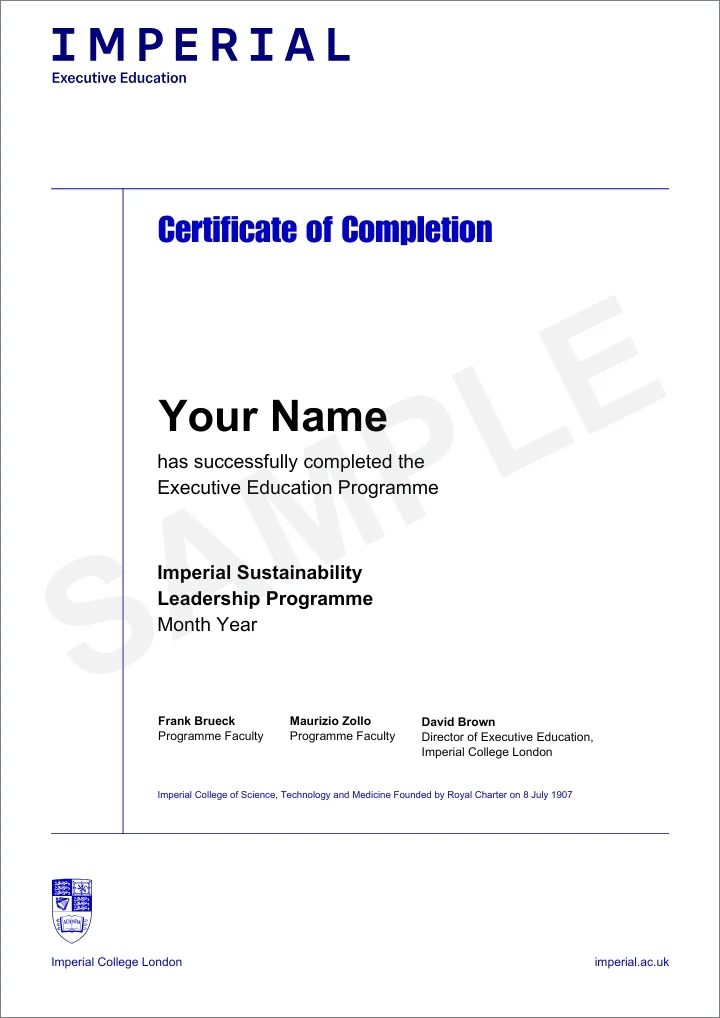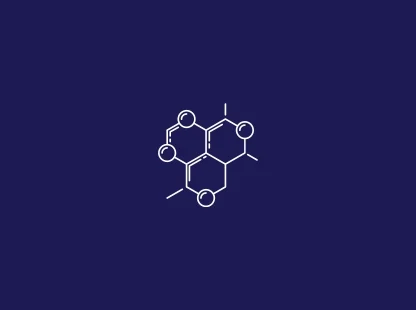Imperial Sustainability Leadership Programme
Hold your business to a higher standard
The Imperial Sustainability Leadership Programme is a transformative 15-week online journey designed to help you create a responsible business model for lasting economic value – one that is purpose-driven to deliver positive environmental and social impact for all stakeholders. Throughout the programme, you will develop innovative methods and adopt a new mindset. You will evolve as a business leader while refining a sustainability innovation strategy for your organisation that rises to the challenge of environmental, social and governance (ESG) goals.
Testimonials
Why take the Sustainability Leadership Programme?
The innovative thinking at Imperial College London has made the school a worldwide leader in the fusion of business, technology and an entrepreneurial mindset. The Imperial Sustainability Leadership Programme delivers a curriculum balanced between strategy and finance, created with the goal of helping you reinvent your business as a sustainable organisation:
Cultivate the mindset to create lasting change
Identify the connections between business and social responsibility
Evaluate your organisation’s sustainability-related metrics
Develop a change plan in the direction of a flourishing organisational culture
Use the six Ps model to evaluate your organisation’s sustainable development
Integrate stakeholder needs into corporate governance structures
Explore relevant sustainability case studies
Receive personal support from a dedicated learning team throughout the programme
Earn a verified digital certificate from Imperial Executive Education
By the end of this 15-week online certificate programme, you will be able to:
Create a sustainability transformation plan for your organisation
Develop a sustainability mindset
Communicate to key stakeholders the connections between economic and environmental success
Imperial Sustainability Leadership Programme has been awarded the 2022 Financial Times Responsible Business Education Award for driving societal change, promoting sustainable development, and demonstrating novel ways to teach digitally in a more inclusive way.
What you will learn
Throughout the programme, your learning will be centred around two threads:
- Data-informed: with insights from the thought leaders at Imperial's Leonardo Centre on Business for Society, which houses the GOLDEN database, you will learn about experimental designs for organisations that help examine the impact of stakeholder-orientated change at the core of business
- Reflective: cultivate a sustainability mindset through an optional meditation track, which research proves is crucial for creating lasting change
Programme experience
Video lectures
Live webinars
Weekly assignments
Interactive activities
Case studies
Discussions and polls
Dedicated programme support team
Continuous programme access
Who should attend?
This 15-week certificate programme is designed for senior executives and functional managers who are interested in building a comprehensive understanding of sustainability as a business practice. It is particularly relevant for the following roles:
Senior executives responsible for overall business growth and strategic initiatives who are seeking to make strategic changes to their business to make it more sustainable, develop a competitive advantage and develop a positive brand image for investors and shareholders.
CSR and sustainability specialists who are seeking to maximise their organisation’s negative environmental and social impact through sustainability practices, make a business case for new initiatives and build an action plan for meeting the organisation's sustainability goals.
Mid- to senior-level functional managers in traditional industries, such as energy, industrial goods, logistics and manufacturing who are seeking to contribute to their organisation’s sustainability efforts within their function and gain an understanding of how sustainability will affect their current role and business practices.
Consultants seeking to offer their clients solutions to help them achieve their sustainability goals, keep up with industry trends in sustainability and gain a respected credential to demonstrate specialisation in sustainability consulting.
Programme faculty

Professor of Strategy and Sustainability, Imperial College Business School, Head of the Department of Management and Entrepreneurship, Scientific Director of the Leonardo Centre at Imperial
As a professor of strategy and sustainability at Imperial College London, Maurizio Zollo aims to understand how organisations learn to grow and adapt to environmental turbulen...

Visiting Researcher, Imperial College Business School, Cofounder and Executive Vice President of GOLDEN for Impact Foundation, Amsterdam, Director of the IKIGAI Corp.
With more than 25 years of experience as a consultant, trainer, lecturer, and researcher in the fields of CSR/sustainability, cultural change, cross-cultural management, team ...

Executive Director of the Leonardo Centre, Imperial College Business School
With 25 years of experience in sustainability, entrepreneurship, innovation, social impact, venture and corporate venture capital, strategy, marketing, and investment banking,...

Certificate
Upon completion of the programme, participants will be awarded a verified digital certificate by Imperial Executive Education.
FAQs
Didn't find what you were looking for? Write to us at learner.success@emeritus.org or Schedule a call with one of our Programme Advisers or call us at +44 208 629 1765 (UK) / +1 315 509 2976 (US) / +65 3138 2451 (SG)
Early registrations are encouraged.
Flexible payment options available.
Starts On




